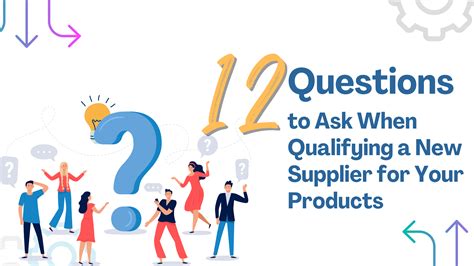what to ask suppliers if they are legit ,questions to ask supplier when screening,what to ask suppliers if they are legit,Learn how to evaluate suppliers effectively with these 5 key questions. The importance of ISO 9001 certification, supplier reputation, quality monitoring, and building strong partnerships to . Low Voltage Switchroom Design Guide. By Steven McFadyen on May 9th, 2012. Low voltage (LV) switchrooms are common across all industries and one of the more common spatial requirements which need to be designed into a project. Main LV switchrooms will typically contain free standing switchboards and Motor Control Centres .

In today's globalized economy, selecting the right supplier for your business is critical. Whether you’re sourcing raw materials, finished products, or services, partnering with legitimate suppliers ensures you maintain product quality, regulatory compliance, and overall business success. However, not all suppliers are created equal, and vetting their credibility is essential.
In this article, we’ll explore 11 key supplier evaluation questions you should ask to determine whether a supplier is legitimate. These questions cover critical areas such as pricing, quality control, certifications, and more, providing a comprehensive guide to supplier selection.
1. What Is Your Company’s Background and Experience?
Understanding the supplier's history is one of the first steps in assessing its legitimacy. Ask them about their company’s background, including the number of years they’ve been in business, and whether they have experience in supplying products or services that align with your needs. A supplier with a long track record in your industry may be more reliable than a new entrant. Here’s why:
- Experience indicates stability and expertise in the industry.
- Industry Reputation can provide insights into their reliability.
- Track Record suggests how they’ve managed challenges and customer expectations over time.
Ask the supplier to provide references from past clients and examples of projects similar to yours. This will give you a better understanding of how they operate in real-world scenarios.
2. Can You Provide Proof of Certifications and Compliance?
Legitimate suppliers should comply with local, regional, or international standards relevant to your industry. For example, suppliers in manufacturing may need certifications like ISO 9001 for quality management, ISO 14001 for environmental management, or food safety certifications such as HACCP.
Ask about:
- Quality certifications (e.g., ISO, Six Sigma).
- Regulatory compliance for specific industries (e.g., FDA for food products, CE for electronics).
- Environmental certifications (e.g., EcoLabel).
Additionally, check whether the supplier can provide proof of compliance with labor laws, safety standards, and environmental guidelines. Any reputable supplier will readily share these credentials and be transparent about their practices.
3. What Is Your Pricing Structure and How Are Prices Determined?
Price is often a determining factor when choosing a supplier, but a legitimate supplier should be transparent about how they price their products or services. Be cautious of suppliers offering exceptionally low prices, as this could indicate subpar quality or questionable business practices.
Here are some key points to cover when discussing pricing:
- How is pricing calculated? Understand the cost breakdown for materials, labor, overheads, and shipping.
- Are there any discounts or special offers? Suppliers often provide bulk or long-term contract discounts.
- What payment terms do you offer? Make sure the payment terms are reasonable and align with your financial practices.
Legitimate suppliers provide detailed and honest pricing structures and avoid hidden fees that might arise later.
4. How Do You Handle Quality Control?
Quality control (QC) is one of the most crucial factors when evaluating a supplier. Ask them about their QC procedures and the steps they take to ensure that the products meet your standards. A trustworthy supplier will have clear, documented processes for monitoring and maintaining product quality.
Questions to ask:
- Do you have an in-house quality control department?
- What testing procedures do you implement? (e.g., physical inspections, lab tests, sampling).
- What is your defect rate? Ask for historical data on defective products and how the supplier handles defects.
- Do you have a process for customer feedback and returns?
Understanding the supplier’s QC process will help you gauge how much control you’ll have over product quality and how quickly issues will be addressed.
5. Can You Provide Samples?
Before committing to a long-term partnership or large order, request samples of the product or service you intend to procure. This will allow you to assess the quality firsthand and verify whether it meets your expectations.
Make sure to evaluate:
- Quality consistency: Check if the sample product meets your specifications.
- Packaging: Ensure the product is packaged correctly to prevent damage during transit.
- Lead time: Assess how long it takes for the supplier to deliver samples.
Legitimate suppliers should not hesitate to provide samples, as this demonstrates their confidence in their products.
6. What Are Your Lead Times and Delivery Capabilities?
Effective supply chain management depends on the ability to get products to your business in a timely manner. Ask the supplier about their lead times, shipping methods, and delivery capabilities. Make sure their lead times align with your production schedules or customer demands.

what to ask suppliers if they are legit LV= launches Electrix proposition to help fleet drivers lease, charge and insure EVs. The electric car market is taking off, with battery electric cars accounting for 11.6% of all UK car registrations in 2021 and 16% of new car sales in June 2022.LOUIS VUITTON Official USA site - Discover luxury connected watches, Louis Vuitton's high-tech smartwatches for men. Art meets innovation in Tambour Horizon with customizable straps.
what to ask suppliers if they are legit - questions to ask supplier when screening